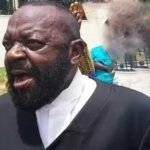A legal challenge surrounding a federal election in Canada, decided by a single vote, raises concerns about the message it sends to the electorate-that some ballots may carry more weight than others, according to the attorney representing a former Member of Parliament. The court is currently deliberating whether to annul the disputed election and mandate a rerun.
In Quebec, legal proceedings are underway during a three-day hearing to determine if an administrative oversight and one solitary vote truly influenced the election outcome in a Montreal suburb.
Nathalie Sinclair-Desgagné, representing the Bloc Québécois, was narrowly defeated by Liberal candidate Tatiana Auguste in the Terrebonne riding during the April election.
The Liberal Party holds 169 seats in the House of Commons, just short of the 172 required for a majority government, while the Bloc Québécois controls 22 seats.
The election night was clouded by uncertainty when initial results showed Auguste leading by 35 votes. However, a validation process conducted on May 1 reversed the outcome, indicating Sinclair-Desgagné was ahead by 44 votes.
According to election regulations, a judicial recount is automatically initiated if the margin between candidates is less than 0.1% of the total valid ballots. This recount, supervised by a Quebec court judge, concluded on Saturday.
Ultimately, the victory was awarded back to Auguste, who secured 23,352 votes compared to Sinclair-Desgagné’s 23,351.
Shortly after, Emmanuelle Bossé, a voter from Terrebonne, revealed that her ballot was excluded from the final tally. Bossé, who cast her vote for Sinclair-Desgagné, explained that her mailed ballot was returned due to an error with the postal code.
“I did not make the mistake with the address on the envelope,” Bossé told CBC’s Radio-Canada. “Elections Canada affixed the label themselves. I simply placed my vote inside and mailed it.” She sent her ballot on April 5, but it was returned nearly a month later, on May 2.
Sinclair-Desgagné’s legal counsel, Stéphane Chatigny, argued in court that Bossé’s rights under the Charter were infringed because her vote was excluded. He warned that allowing the election result to stand would “convey a damaging message to voters that even Elections Canada can err without facing repercussions, despite the critical influence on the election’s outcome.”
“Denying the cancellation of the election would imply that certain votes hold greater value than others,” Chatigny stated. “Such a precedent would erode public trust permanently.”
Presiding Justice Éric Dufour referenced a 2012 Supreme Court of Canada ruling, Opitz v Wrzesnewskyj, which determined that minor clerical mistakes alone do not warrant invalidating an election. The court emphasized that there must be clear evidence that the number of ineligible votes could have altered the election result to justify annulling it and ordering a new vote.






















